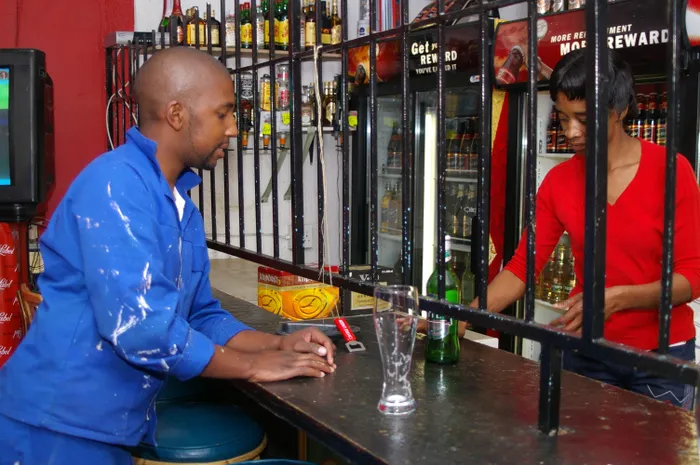Value of illegal booze market continues to grow, but not as fast as the legal sector
.

A legal shebeen in Alexandra township, Johannesburg Smuggling has dropped from one in three purchases of alcohol to one in every five, a new report by Euromonitor International in conjunction with the Drinks Federation of South Africa has found.
Image: Nicola Mawson
Fake booze volumes are growing faster than what smugglers are bringing into the country, although the value of sales in the illicit market are not gaining pace as fast as the legal one, with the cost of legal alcohol having been pushed up by price increases.
This is according to the latest research from Euromonitor International in conjunction with the Drinks Federation of South Africa (DF-SA). It found that the market for illicit alcohol accounts for a fifth of total alcohol sales in South Africa.
“The drivers of illicit alcohol have changed over the last four years, with counterfeiting growing at the expense of smuggling. Since 2017, the market share for counterfeiting alone has grown from 24% to 31%. Its category value has almost doubled from R4.9 billion in 2017 to R9.8bn 2024,” their report said.
In the report, they attributed this to the fact that demand has tapered off since the end of the COVID-19 pandemic and the resultant lockdown that saw sales of alcohol and cigarettes banned, leading to people turning to buying these items from providers who sourced them from over the border.
Smuggling has dropped from one in three purchases to one in every five, the research found. “However, counterfeit and illicit brands have grown substantially since the pandemic, becoming the largest illicit category by volume in 2024,” it said.
Richard Rivett-Carnac, South African Breweries CEO and chairman of DF-SA said that the sale of illegal booze is “not just a public health concern, but a direct threat to fiscal revenues and formal businesses that contribute significantly to the economy and job creation”.
The legal alcohol sector supports around one in 31 jobs and generates over R100bn in tax revenue annually, said Rivett-Carnac. “When illicit traders avoid tax, undercut the market, and exploit vulnerable consumers, we all lose, he said.
Illegal booze cost the economy R16.5 billion last year, up from R11.3bn four years previously, when South Africa was in lockdown. The bulk of this amount came from illegal sales of spirits.
When Finance Minister Enoch Godongwana presented Budget 3.0 in May, he was faced with a revenue hole of R75bn.
The report stated that enforcement continues to be a challenge as both the South African Revenue Service and the South African Police Service “have reported capacity and resource constraints, especially the illicit trade task team which deals with all illicit goods, not only alcohol”.
However, it said that trade sources indicate that the greater involvement by industry in identifying culprits and working together with law enforcement agencies has resulted in positive outcomes.
IOL
Related Topics: